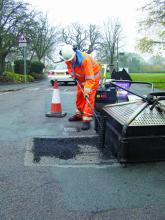Road owners around the world “need a highway to heaven” according to Michael Cramer MEP, chairman of the European Parliament transport committee. Speaking at PPRS Paris 2015, the pavement preservation and recycling summit, Cramer said that Europe’s current road policy “lies somewhere between AC/DC’s Highway to Hell and Led Zeppelin’s Stairway to Heaven” and that, to mis-quote Bill Clinton, the EU needs to start thinking “it’s road maintenance stupid” whenever the subject of highway investment is under consi
Road owners around the world “need a highway to heaven” according to Michael Cramer MEP, chairman of the European Parliament transport committee. Speaking at 7924 PPRS 2015, the pavement preservation and recycling summit, Cramer said that Europe’s current road policy “lies somewhere between AC/DC’s Highway to Hell and Led Zeppelin’s Stairway to Heaven” and that, to mis-quote Bill Clinton, the EU needs to start thinking “it’s road maintenance stupid” whenever the subject of highway investment is under consideration.
“We need to move away from new mega-projects and put in place a large-scale, long-term maintenance package for all transport modes,” Cramer says, because the “3287 EU has not done a good job.” He firmly believes that road owners and operators world-wide have got to find new ways to make more of the existing infrastructure. “It’s time for a new dogma,” he told the conference of more than 800 delegates, “we must do better with what already have.”
Almost three-quarters of all EU road spending goes on new roads, and only 27% on maintenance. As a result, “we are heading in the wrong direction,” says Cramer, not least “because every minister loves cutting the red tape on a big new project. Our leaders would be much better preserving what we have already got … this would have a huge impact on the climate and on our national budgets.”
Health, quality of life, CO2 emissions and affordable mobility are all key issues that would benefit from a much stronger emphasis on road maintenance rather than new-build says Cramer, a view that was echoed by keynote speaker and conference chairman Jean-Francois Corte, head of3141 PIARC, the World Road Association.
All around the globe, roads are decaying, bridges are having to close, accident rates are rising and congestion is worsening because we are not spending enough money on maintaining our highways said Corte. “A lack of action in this area is, in effect, a disinvestment in our future,” he said, “and we are creating a massive burden for our children in the years ahead.”
Most of the roads in the world’s developed economies were built in the second half of the twentieth century, Corte told PPRS Paris 2015, and “they have been the trade routes that have allowed improved social development and more trade.” Today, however, they have become “ageing assets that have not been well maintained and they are fragile.” Ever greater levels of congestion, ever higher traffic flows and poor quality repairs are hitting the world’s leading developed economies hard, and the economic crisis of 2008 is far from over. The time for action is now.
“We need to move away from new mega-projects and put in place a large-scale, long-term maintenance package for all transport modes,” Cramer says, because the “
Almost three-quarters of all EU road spending goes on new roads, and only 27% on maintenance. As a result, “we are heading in the wrong direction,” says Cramer, not least “because every minister loves cutting the red tape on a big new project. Our leaders would be much better preserving what we have already got … this would have a huge impact on the climate and on our national budgets.”
Health, quality of life, CO2 emissions and affordable mobility are all key issues that would benefit from a much stronger emphasis on road maintenance rather than new-build says Cramer, a view that was echoed by keynote speaker and conference chairman Jean-Francois Corte, head of
All around the globe, roads are decaying, bridges are having to close, accident rates are rising and congestion is worsening because we are not spending enough money on maintaining our highways said Corte. “A lack of action in this area is, in effect, a disinvestment in our future,” he said, “and we are creating a massive burden for our children in the years ahead.”
Most of the roads in the world’s developed economies were built in the second half of the twentieth century, Corte told PPRS Paris 2015, and “they have been the trade routes that have allowed improved social development and more trade.” Today, however, they have become “ageing assets that have not been well maintained and they are fragile.” Ever greater levels of congestion, ever higher traffic flows and poor quality repairs are hitting the world’s leading developed economies hard, and the economic crisis of 2008 is far from over. The time for action is now.





